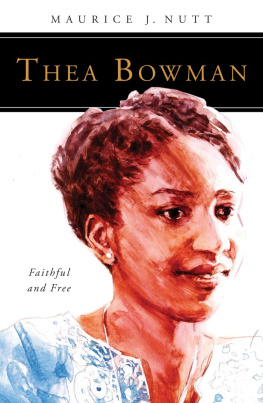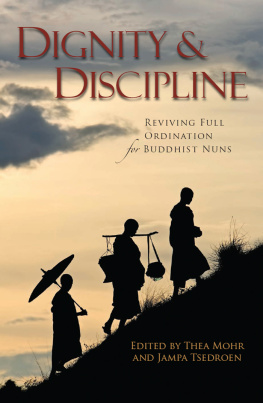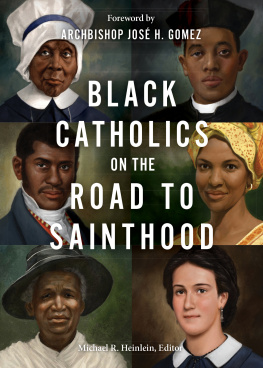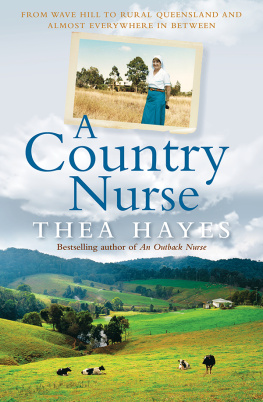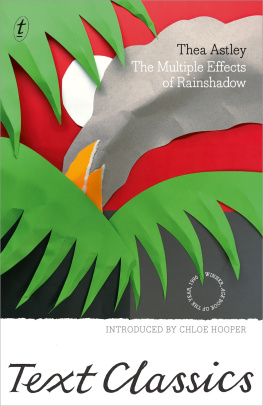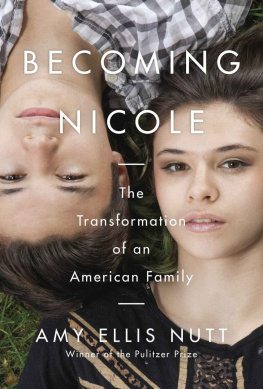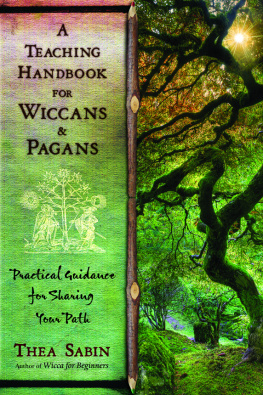Introduction
I still didnt hear Mike Wallace say, Black is beautiful. Confidently, albeit coerced, the veteran CBS News correspondent responded to the Mississippi-born, black Catholic sisters persuasion by repeating, Black is beautiful! And the sister shouted with enthusiastic approval, Amen!
This is how many Americans were introduced to the charismatic and enthralling black, vowed religious woman, Sister Thea Bowman, FSPA. At every moment of the 60 Minutes interview, Sister Thea was confident, poised, assured, direct, and well informed. When she felt like she needed to, she threw a question back to Wallace, What do you think? And though Wallace was telling her story, at all times Sister Thea controlled her narrative. Sister Thea possessed what black church folk call holy boldness, meaning that you speak your truth knowing that it comes from the Lord. To minimize Sister Theas holy boldness and confidence as being any kind of self-aggrandizement would be to miss the totality of her personality, her spirituality, her mission, and her ministry. Thea was unapologetically simply being Thea.
The 60 Minutes segment featuring Sister Thea that aired on May 3, 1987, held before the nation a black woman, an engaging educator, an astute intellectual, an ardent advocate for racial justice and reconciliation; a soul stirring singer of the spiritual songs of her ancestors, a prophetic preacher, and an unconventional, African robe-wearing Catholic Sister. This mesmerizing televised interview featured a cancer-ridden sister who spread Gospel joy, brought healing to conflicts within communities and within the church, offered clarity to those who lacked understanding of the black Catholic experience, and taught us how to accept Gods will while struggling, suffering, and ultimately dying. In her, we found someone extraordinary. Franciscan Sister of Perpetual Adoration Sister Thea Bowman was like no other personand certainly no other nunyou would ever meet!
Well, no one ever met Thea; no, you encountered her. Her bodacious, engaging personality drew you to her. Once you had a Thea encounter, you would never forget her. Her personality and joy were so infectious that her presence seems to remain with us still. When her friends speak of Sister Thea, it is difficult to speak of her in the past tense.
My first Thea encounter occurred in July of 1984. I was a professed Redemptorist seminarian attending my first Joint Conference of black Catholic clergy, permanent deacons and their wives, religious men and women, and seminarians. The meeting was held in New Orleans, and I was a bit shell-shocked at seeing so many black religious women and men. I had attended a mostly white seminary and was not used to being around so many people who looked like me and who shared the same vocation. The highlight of that years Joint Conference was attending the very first commencement of the Institute for Black Catholic Studies (IBCS) at Xavier University of Louisiana, the only historically black and Catholic university in the nation. The three graduatesSister Eva Marie Lumas, SSS, Sister Addie Lorraine Walker, SSND, and Father James Voelkerwould receive their master of theology (ThM) degrees in Black Catholic Studies, the first time such a degree was awarded in the nations history. While I was elated to witness history, I was captivated by the speech given by the commencement speaker, Sister Thea Bowman, FSPA, PhD. It was the first time I had ever heard her speak, and I do not remember what she exactly said that evening. But I have never forgotten how she made me feel. Her words penetrated the very core of my emotions, especially my feelings about having to assimilate into the dominant culture of my religious community to be accepted. She validated my cultural heritage and religious expressions and encouraged me to share my gifts with the Catholic Church. I recall feeling embarrassed because I cried throughout Theas commencement address. Indeed, it was a cathartic moment for me. It was for me a moment of spiritual and cultural emancipation and liberation to be the black and Catholic child of God I was created to be.
After the commencement ceremony, my Redemptorist confrere, Glenn Parker, CSsR, introduced me to his good friend, Sister Thea. I was so in awe of her that I remember simply saying hello and that she said how happy she was that the Redemptorists were getting more black vocations. My Redemptorist confrere encouraged me to join him at the IBCS and I enrolled the following summer in the masters degree program there.
I came to know Thea Bowman during the last six years of her life. While I didnt know it at the time, I met her the same year that she was diagnosed with breast cancer and the year that both her parents died. One can only imagine what a dreadful year 1984 must have been for her, and yet she carried on with her life and her teaching, preaching, singing, evangelizing, and spreading the joy of Jesus Christ with steadfast vigor and determination. Later I would learn that Theas daily mantra throughout her struggle with cancer was that she was going to live until she died. And that she did. As her student, I was amazed at her boundless energy as she taught her classes. Not knowing how long Sister Thea would live, I was committed to taking every class that she offered. I would also be the last student she would advise in the writing of their masters thesis. Without question, Thea Bowman was a demanding teacher. She could easily discern her students cognitive and analytical abilities and would push them to produce their very best. If she thought that a student was not well prepared for a class presentation, she had no problem asking the student to sit down and come back to class better prepared tomorrow. She would not allow a student to present less than their best understanding of the material. Besides, Sister Thea was not going to let anyone waste her time or the class time by being unprepared! Seemingly tough as a classroom teacher, Sister Thea knew that she was not only preparing her students for classroom lessons but for life. She knew from her own lived experiences that nothing would be easily given to black students, and so they had to strive to be exceptional inside and outside of the classroom. Those were life-lessons that I am sure every student taught by Sister Thea Bowman has committed to memory and cherished in his or her heart.
The Thea Bowman story, like the woman herself, is far from banal or mundane. No, it is multifaceted, inspiring, and unconventional. Imagine growing up in the paradox of being the granddaughter of a former slave yet the only daughter and pride and joy of a middle-class educator and a physician amid the racism and segregation of the so-called separate but equal Jim Crow legal system of Mississippi. Her conversion to Catholicism was rooted in a pragmatic living of the Gospel of Jesus Christ as she witnessed and benefitted from the dedicated Franciscan Sisters of Perpetual Adoration who taught at her childhood school, Holy Child Jesus in Canton, Mississippi. Seeing faith in action in her hometown as a child undoubtedly shaped Theas understanding of Christian discipleship. She also desired to witness to Jesus Christ by serving the poor and marginalized, by educating those who did not have equal access to adequate education, to give comfort to those who were oppressed by the unjust and the unreasonable laws of the land. The indelible mark and profound impression that these white Northern nuns made on this highly impressionable black Southern girl convinced her that God was indeed calling her to leave all the things that were familiar to her. The yearning to serve God was undeniable. In Canton, Mississippi this young girl gave up her birth name, Bertha, and became Sister Mary Thea. She left behind all things Southern, soulful, satisfying, and familiar to sojourn to a far-away northern town called La Crosse, Wisconsin, to things unfamiliar and not always satisfyingespecially the food! Her commitment to her vows and to the religious way of life is summed up in one of the spirituals she loved to sing: Done made my vow to Lord, and I never will turn back. I will go, I shall go, to see what the end will be!

